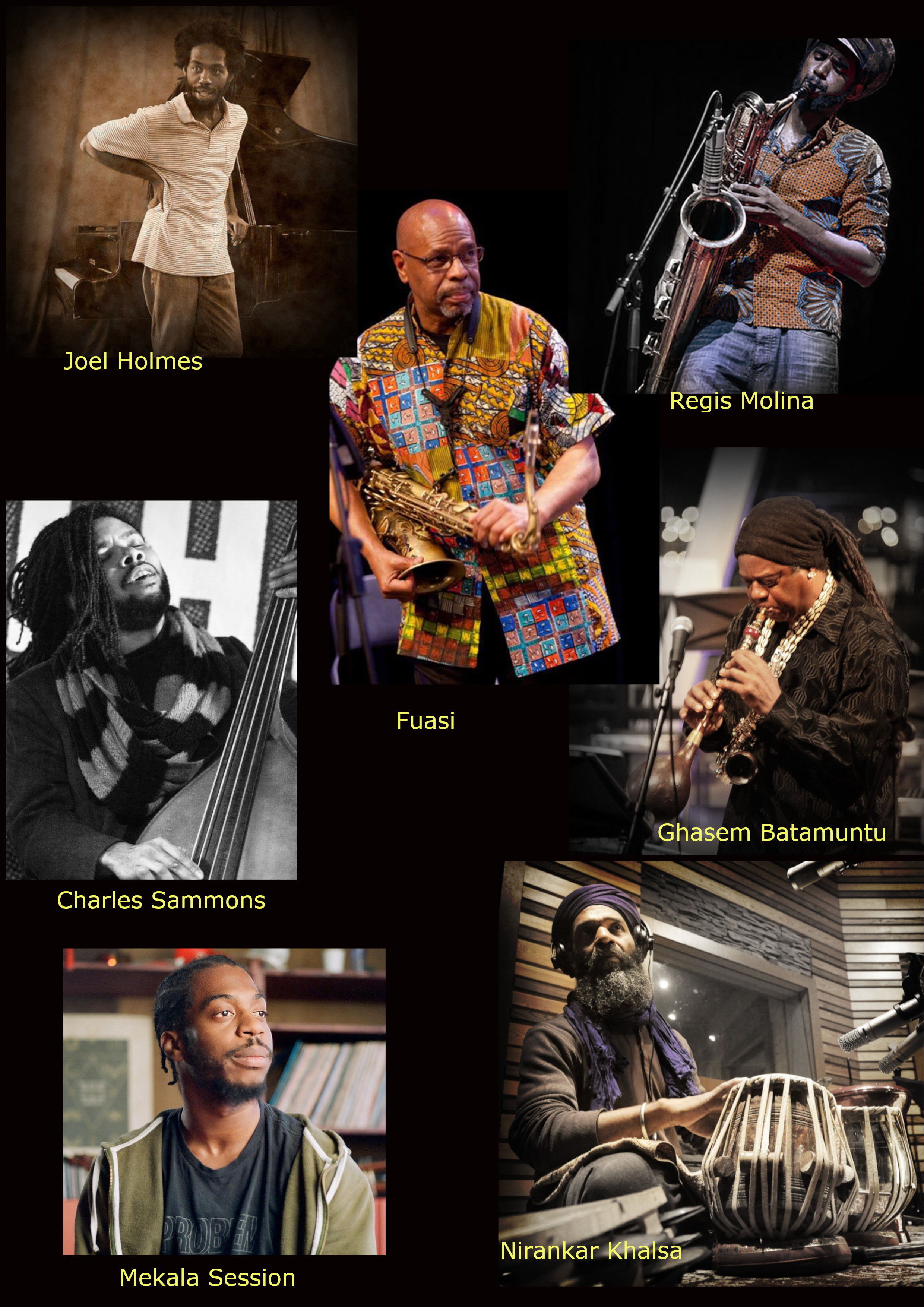Pan Afrikan People's Arktet
14/03/24 14:31
We are repeating that special musical evening once again in the Schlot, performing the compositions from their memorable concert recorded  last May 2023.
last May 2023.
The Pan Afrikan Peoples Arktet
celebrating their LP Release party.
It will be a night to remember!
Looking forward to seeing you at the Schlot…and tell a friend.
"Not Your Standard Jazz…Fresh Sounds From Beyond"
|
Original compositions from Fuasi Abdul-Khaliq inspired by the great Horace Tapscott and the Pan Afrikan Peoples Arkestra.
|
The Pan Afrikan Peoples Arktet LP Release Party
Saturday, May 25, 2024 in Kunstfabrik Schlot Jazz Club
Invalidenstraße 117, 10115 Berlin
Reservations: 030 4482160
Concert begins: 21Uhr
|
Fuasi presents members of the...
"Pan Afrikan Peoples Arkestra and Friends"
About the project
|
Horace Tapscott and his approach are the condensation nucleus for this project. Tapscott brought the Pan-Afrikan Peoples Arkestra to life in 1961 in Los Angeles. Sixty two years later and right here in Berlin, we are building a contemporary project with a spiritual energy for the 21st century and the challenges we face today. Headed by Arkestra member
Fuasi Abdul-Khaliq
, the octet brings together the largest number of Tapscott´s disciples living abroad, in addition to the heir to Horace himself, the current conductor and manager of the Pan-Afrikan Peoples Arkestra,
Mekala Session
, direct from Los Angeles!
Just reading about the octet you will see that we are in for a rare treat. Next to Fuasi and Mekala there's
Sabir Mateen
, the most recorded tenor sax with Horace for Nimbus Records and a landmark in the land of the free (jazz).
Ghasem Batamuntu
, who carried the tradition of the Arkestra to Europe with the renowned Rotterdam based Nu Nova Compound.
Havana , Cuba native alto sax prodigy,
Regis Molina
.
Joel Holmes
, the four-time grammy nominated pianist and composer. The innovative bassist
Charles Sammons
.
Nirankar Khalsa,
an outstanding percussionist and drummer who has played alongside Alice Coltrane among others and will give the project a beat you've never heard before.
It will be a night to remember!
| Fuasi Abdul-Khaliq - |
ten sax, bass clarinet, flute, bari sax, percussion.
| Regis Molina - |
alto sax, bari sax, flute
| Ghasem Batamuntu - |
sop sax, percussion
| Sabir Mateen - |
ten sax, clarinet
| Nirankar Khalsa - |
darbuka, bongos, tablas, percussion
| www.horticulturerecords.com |
***************************************************************************************************
|
NOW AVAILABLE!
|
|
BOOK
-
by the end of the month
|
VINYL
,
CD
-
later this spring
|
BIENTÔT DISPONIBLE !
|
LIVRE
- d'ici la fin du mois
|
VINYLE
,
CD
- au printemps
|

THE MUSIC FINDS A WAY |
|
A PAPA/UGMAA Oral History
of Growing Up In Postwar
South Central Los Angeles
|
by
Steven L. Isoardi
with artists of |
The Pan Afrikan Peoples Arkestra
and |
The Union of God’s Musicians and Artists Ascension
|
✭✭✭
|
In the post World War II era, dozens of young African Americans in South Central Los Angeles found their way to careers in music. In a community facing challenging social conditions and with little to no outside support, they would become artists, supported by the best that their community and culture had to offer, from neighborhood and family to schools and churches, private teachers, formal and informal spaces and institutions, and more than a few unsung heroes.
|
|
✭✭✭
|
|
|
“The neighborhood was tough, but it’s not like it is today.... I mean I knew that we were not rich people, but I never, ever felt poor.” —
pianist Bobby West
|
“I was sitting up there tripping off of James Brown, and my cousin came in very angry. ‘You need to stop all that bullshit and get turned on to jazz music, because it’s a way of life.’ That freaked me out, man, and I was freaked for the rest of my life.” —
trumpeter Jon Williams
|
“Our music is contributive, rather than competitive.” —
pianist Horace Tapscott
|
BOOK
|
/
LIVRE
100 pages (in English)
Front cover illustration and design by |
Paul Rogers
|

HORACE TAPSCOTT |
|
with the
PAN AFRIKAN PEOPLES ARKESTRA
|
and the
GREAT VOICE OF UGMAA
LIVE AT LACMA, 1998 |
|
| ✭✭✭ |
|
HIGH QUALITY VINYL
|
12" LP • 180g vinyl • Pressed by PALLAS in Germany
|
Flip back cover • 2-page insert
|
Liner Notes by
Steven L. Isoardi
Photos by |
Warren Berman
|
Side A:
Fela, Fela
Side B: |
Why Don't You Listen?
|

HORACE TAPSCOTT |
|
with the
PAN AFRIKAN PEOPLES ARKESTRA
|
ANCESTRAL ECHOES
|
The Covina Sessions, 1976
|
| ✭✭✭ |
|
CD
|
Previously unpublished studio recordings!
|
This
CD
will include a
16-page booklet
with liner notes by |
Steven L. Isoardi
, statements by
Fuasi Abdul-Khaliq
,
James Andrews
,
Charles Chandler
,
Kamau Daáood
,
Kachina Roberts
and
Jesse Sharps
, photos by
Mark Weber
and courtesy of the
Horace Tapscott Archive
and some rare documents.
1-
Ancestral Echoes
2- |
Sketches of Drunken Mary
3- |
Jo Annette
4- |
Eternal Egypt Suite
|
✭✭✭
|
 last May 2023.
last May 2023. 

